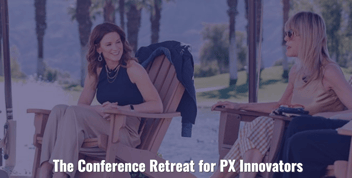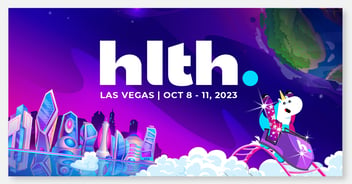For the second year in a row, I was able to join many of America’s top CIOs at the CHIME Fall Forum. This is a conference that I always enjoy because it really embodies a “work hard, play hard” mindset. There are lots of early morning activities like yoga and running, the food is great, and the conference sessions are always stellar. The people are great too. There is something special about this particular conference, that feels like a class reunion and an executive boot camp had a child together. I love it.
When I attend a conference like this I like to look back and observe the individual experiences and sessions I enjoyed and see what kind of theme emerges. This year the theme for me was, “People.”
It kicked off with a great keynote from Dr. Anthony Mazzarelli that highlighted the role that compassion plays in our overall well-being, as well as how impactful it can be for healthcare outcomes, patient satisfaction, and reducing burnout among staff. He shared a lot of great research that was done, such as the “Harvard Study of Adult Development” that has been tracking a cohort of people for 85 years. The number one factor for happiness and longevity? Positive social relationships. One of the nuggets of wisdom he shared to help us all have better relationships had to do with how to mend a relationship that you may have damaged: “Never ruin an apology with an excuse.”
Next, I attended the track session entitled, “Innovative IT Strategies to Support Clinicians: From Reducing Tech Stress to Improving Efficiencies.” In it, CT Lin from UCHealth – Colorado and Terri Couts from Guthrie Clinic shared some great insights from real-world projects at their hospitals. The real focus here was on the clinical staff, and an acknowledgement that they have a huge administrative burden placed upon them, and it’s a top priority to reduce it. The recommendations were straightforward—remove technology roadblocks, explain the “why” to people, and treat clinicians as consumers, not captives. What really stood out in each of their accounts was the dedication and follow-through on those principles, and the iterative nature of their work to successively improve their software and workflows until they got it right and had satisfied “customers.” When the people were satisfied, the organization got the results they were hoping for—high employee participation and adherence to the training curriculum. They also found that for certain jobs, they freed up significant time that could now be used to care for patients.
Since the release of ChatGPT a little over a year ago, AI has also been on everyone’s mind. What is it? How do we use it? What’s it good at? What are the risks? At Gozio we are technologists at heart, so many of us have been using early versions of generative AI tools for years. It’s fun to see the idea go “mainstream.” There were a number of great talks given on this topic, and I’d like to highlight two of them.
The first was a panel that discussed, “The Benefits, Risks, and Unprecedented Potential of AI in Healthcare.” The three panelists all had a lot to say about AI. Dr. Anthony Chang of Children’s Hospital of Orange County has a background and leadership role in the AI community that is too impressive to recount here, and he struck me as someone in healthcare who has a strong understanding of what kind of software is suited for what kinds of tasks. Usually when people discuss “AI” they mush together AGI, Generative AI, ML, and expert systems and just refer to all of that as “AI.” Then the jobs to be done by those different tools get mushed together and strange discussions about what will happen in the future emerge. Dr. Chang is someone to follow in this space, because he deeply understands healthcare, and AI, technically. Another panelist, Aaron Miri from Baptist Health Jacksonville (who we’re proud to say is a Gozio client) also had some keen insights about just how fast and cheap AI is going to become as compute architectures adapt and costs are driven down. Which led to the tip of the cap to the third panelist, Sarah Hatchett from the Cleveland Clinic. The Cleveland Clinic has, among its many amazing distinctions, that of being the first Healthcare Research organization to have its own on-site quantum computer.
All three panelists agreed that Generative AI possessing the capabilities of LLMs (like ChatGPT) are already entering healthcare and will have an early impact on non-clinical aspects of operations. The idea being, use emerging technology in areas least likely to harm patients, and take advantage of what it can do for operational efficiencies.
Which leads to the second AI session that I enjoyed, with an admitted bias. Michael Blumental from Hyro (who we’re proud to say is a Gozio partner) gave a great case study of how Intermountain Health is using Hyro’s product to save hundreds of hours in call center operations, and also greatly reduce wait times and cut abandonment rates in half. So more completed calls in less time, which seems counterintuitive! Remember, I am biased because I know Michael and we partner with her firm, but let me tell you one of the things that I love about what they do. They give the hospital the ability to curate the dataset that the AI draws upon to answer questions. This means you have control over where the AI gets its answers to questions and can avoid some of the scary stuff you read about where AIs hallucinate and make up answers to things that simply aren’t true. This is because “wild” AIs like ChatGPT are trained on a massive dataset of language, including fiction literature, as well as millions of human conversations pulled from social media sites. If there’s a less-reliable place to find truth in 2023 than social media, I’d be shocked.
So, while there was a lot of talk about AI, the undercurrent still fit my theme—people. How would people use AI? How will AI affect people? How should AI be used to best benefit people? What can we do, as leaders, to help our people—our staff and patients—with tools like this. Combined with all the great connections I made outside of the sessions and at the meals, once again, the CHIME Fall Forum was a home run. I love this conference and can’t wait to attend in 2024!


